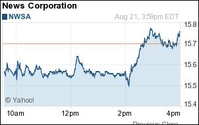 The party is over for third parties,
and ad networks are bracing for the loss of some of the most valuable inventory in the exchange-based media marketplace, as News Corp. takes its secondary inventory back in-house with the launch of
its "global programmatic advertising exchange." The move will be felt by some of the biggest ad networks in the business, including names like ValueClick and Undertone.
The party is over for third parties,
and ad networks are bracing for the loss of some of the most valuable inventory in the exchange-based media marketplace, as News Corp. takes its secondary inventory back in-house with the launch of
its "global programmatic advertising exchange." The move will be felt by some of the biggest ad networks in the business, including names like ValueClick and Undertone.
News Corp.'s plan is another in a long
list of moves this summer that suggest that ad tech consolidation has begun, but its significance is much deeper than that. For one, it shows that News Corp. is willing to adopt programmatic across
all its properties, both online and mobile. Interpublic has made known its goal of automating 50% of media buying — and made strides toward that goal yesterday by striking a deal with five
media giants — but News Corp.'s plan represents the first time a major premium publisher has truly put a stake in the ground and claimed programmatic.
advertisement
advertisement
In doing so, the company
has closed its doors to third parties that touted their premium inventory, perhaps making it even more premium than it was before. That quality of inventory has been the holy grail of the programmatic
space, and News Corp.'s decision to nix the third-party ad networks is bound to set precedents.
"I believe media companies now require both a DMP (data strategy) and exchange," said
Skip Brand, Martini Media's founder and CEO. "My opinion is that these are not nice to have, but must haves. Those media companies that have soft elbows are doing great digitally. The hard
elbows and being competitive worked in the old media world," he said, adding that he "loves" the new exchange.
So what are the repercussions for the shunned ad networks? Eric
Franchi, co-founder of Undertone, doesn't seem too concerned. He said he's not worried about missing out on premium inventory "until it's a trend," and he wasn't ready to call News Corp.'s decision an
industry trend.
"The reality is, you are talking about one publisher. And yes -- the publisher is representing lots of publishers, but there's lots of high-quality media companies
that have all different kinds of partnerships," he said. "There's a ton of available inventory out there -- and a lot of high-quality inventory."
Franchi pointed out that he "can't
remember" the last time an announcement like this had been made in the past five years. He commented that when announcements similar to this one had been made in the past, "a lot of those publishers
re-engaged with partners in the marketplace -- Undertone included. With private marketplaces and private exchanges, a lot of them aren't necessarily driving the revenue that publishers are expecting
them to [because] there's not a lot of buyers of that inventory. It's still fairly early," he said.
While Franchi appears confident that News Corp.'s decision to bring everything
in-house doesn't "materially affect [Undertone's] business," just because publishers re-engaged with ex-partners in the past doesn't mean it will happen again. History does repeat itself, but the
programmatic space and exchanges were mostly ideas just five years ago, so News Corp. is truly forging its own path.
That path -- one that they have not only set themselves
on, but the entire programmatic premium space as well -- is not well defined. The "how-to" is in their hands, at least for however long other publishers let them take the journey alone.